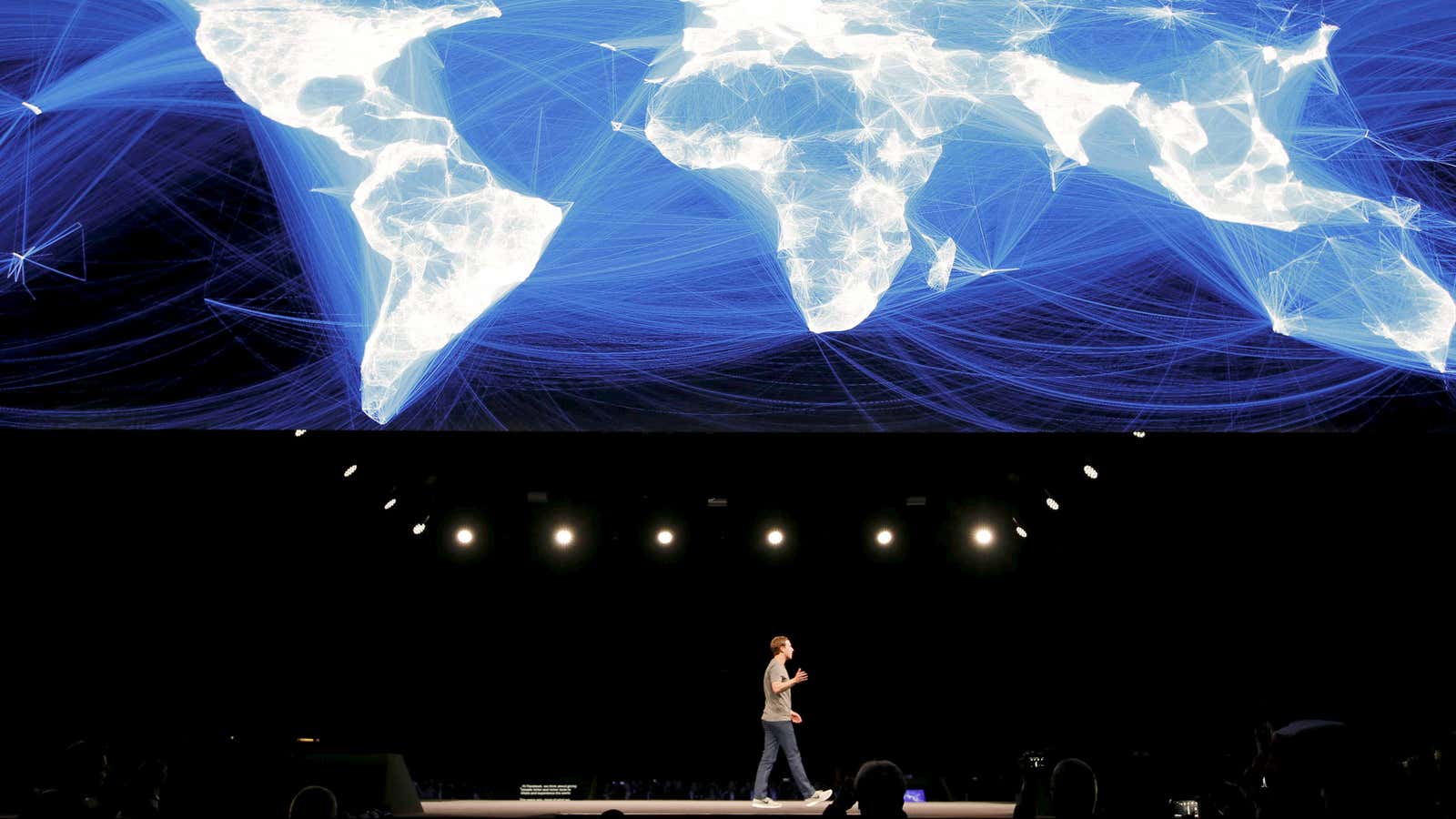Barcelona, Spain
The telco operators, network equipment vendors, and smartphone makers who attend Mobile World Congress (MWC) in Spain each year have grown accustomed to seeing Mark Zuckerberg in attendance. Facebook is one of the main things customers use their smartphones for, after all. The Facebook founder has spoken at the world’s major telecoms trade fair since 2014, but was absent this year—supposedly part of a normal rotation of speakers, though Facebook hasn’t commented when we asked.
Facebook had no public presence on the exhibition floor of the trade fair, choosing instead to host partners in a large block of private meeting rooms. It didn’t have any executives on the main conference agenda either, despite the fact that senior execs like its head of Europe, the Middle East, and Africa, Nicola Mendelsohn, spoke at a companion, startup-focused, event.
This was in contrast to fellow web giant Google, whose presence was felt throughout the trade fair. It took up a courtyard where conference-goers could get smoothies from an Android-shaped bar by paying with a high-five. There were major product announcements around Google Assistant and Google Home speaker.
Facebook’s low profile at MWC is understandable. The world’s largest social network gets all the benefits of increased smartphone connectivity—more users to serve ads to—while the telcos are saddled with the bills for cell towers and retail stores. What’s more, telcos are getting paid a lot less for messages and calls, thanks to the far cheaper alternatives from the likes of Facebook Messenger and Whatsapp.
Instead, Facebook has focused on a behind-the-scenes initiative, the Telecom Infra Project (TIP), which could go some way to driving down telcos’s equipment costs and get more users on smartphones, and ultimately, Facebook. The project has attracted more than 450 carriers and equipment vendors—basically the entire telecom industry—since it was launched at last year’s congress, with Facebook playing the role of convenor. “Facebook has an interesting place in the industry,” says Brendan Gibbs, a vice president of strategy at Cisco, which makes networking equipment for telcos. “They are a little like Switzerland: they are not a direct service provider; not an equipment manufacturer … they are an intermediary and interested party.”
With TIP, Facebook is trying to do with cellular technology what it did to the internet with its Open Compute project. That effort saw Facebook convene technology’s biggest names to collaborate on open-source designs on everything from chips to servers. The benefits play out this way: telcos get open-source designs for network gear, meaning there’s less chance they’re beholden to manufacturers like Ericsson, Nokia, or Huawei; gear manufacturers get a say in how these solutions are designed, and Facebook eventually gets more users.
In Barcelona, reporters were ushered into Facebook’s meeting rooms where its infrastructure chief, Jay Parikh, gave a briefing on the latest with its TIP involvement. Among the slew of technical announcements, like the 500 miles of fiber it will help lay in Uganda; its continued belief in its giant drone project, Aquila, which will beam internet to remote regions even though Google has abandoned its effort; was a curious cultural one.
Parikh said telcos were coming to Facebook for help to get their own people up to speed. Telco staff aren’t used to moving fast and breaking things in the Facebook fashion. “They get stuck innovating fast because they might be used to working a certain way for the past 50 years,” he said. “They can’t adopt new technology without following lots of process.”
The solution is a TIP working group focused on getting telcos to “reinvent and rethink their own internal organization,” Parikh said. In practice that means Facebook teaching telcos about Valley buzzwords like “DevOps“—a way of organizing engineering teams—and how to release code at a faster rate. Facebook will publish white papers and make videos showing how it all works. “So they see, oh, this is what it means to change my culture,” Parikh said.
With TIP, Facebook seems to have created a way to align the telecom industry’s competing agendas. It remains a peripheral project to most telcos, as it hasn’t yet produced Open Compute-style results, but they’re happy to go along with it. As Yves Bellego, director of network strategy at French telco Orange, puts it: “The name of Facebook gives a bit of spotlight to the initiative, but it’s by far not the only initiative we engage in. We do not put more priority on one over another.”
